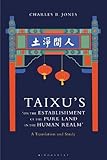Taixu's 'On the Establishment of the Pure Land in the Human Realm' : a translation and study / Charles B. Jones.
Material type: TextLanguage: English Original language: Chinese Publisher: London : Bloomsbury Publishing, [2021]Description: 1 online resource (167 pages)Content type:
TextLanguage: English Original language: Chinese Publisher: London : Bloomsbury Publishing, [2021]Description: 1 online resource (167 pages)Content type: - 9781350140578
- 1350140570
- 9781350144279
- 1350144274
- 9781350140585
- 1350140589
- 294.3926 23
- 294.30951 23
- BQ8518.7 .J65 2021
- online - EBSCO
| Item type | Current library | Call number | URL | Status | Notes | Barcode | |
|---|---|---|---|---|---|---|---|
 eBook
eBook
|
Biblioteca "Angelicum" Pont. Univ. S.Tommaso d'Aquino Nuvola online | online - EBSCO (Browse shelf(Opens below)) | Online access | Not for loan (Accesso limitato) | Accesso per gli utenti autorizzati / Access for authorized users | (ebsco)2708362 |
Includes bibliographical references and index.
Cover -- Half Title -- Series -- Title -- Copyright -- Dedication -- frontispiece -- Contents -- Preface and Acknowledgments -- Part One Introductory Study -- 1 Introduction -- 2 Taixu's Life to 1926 -- 3 Previous Western Writings on Taixu's Ideas about the "Pure Land in the Human Realm" -- 4 Utopianism East and West in Taixu's Essay -- 5 Key Themes -- Part Two The Translation -- 6 The Translation: ((Jianshe renjian jingtu lun ...), By Master Taixu ... (1890-1947)) -- Part Three The Pure Land in the Human Realm after Taixu and Conclusions -- 7 The Pure Land in the Human Realm after Taixu
8 Concluding Remarks -- Works. Cited -- Index
Text in English, partially translated from the Chinese.
"In this book, Charles B. Jones provides the first English language translation of one of the most important texts of modern Chinese Buddhism: monk-reformer Taixu's 'On the Establishment of the Pure Land in the Human Realm'. The essay, written in 1926 as part of Taixu's attempt to revive Chinese Buddhism with a Humanistic Buddhist approach, incorporates Western thought into a reconstruction of the idea of the 'Pure Land in the human realm'. In his commentary on the text, Jones argues that it has been widely misunderstood and mischaracterized. Jones demonstrates that, besides laying out the very modern idea of the Pure Land in the human realm as a slogan for Buddhist engagement with the problems of the modern world, the essay does not, as commonly assumed, discourage practices leading to rebirth in the Pure Land. He also shows that the 'human realm' can mean anywhere in Buddhist cosmology that humans reside, and that the essay's attempts to reconcile Buddhism with modern science is tentative and incomplete. Jones reveals that the essay promotes visions of both paradises and utopias, and that Taixu supports his ideas with many lengthy sutra quotations. The book concludes with an examination of how Taixu's followers developed the idea of the Pure Land in the human realm into a more coherent and modernized ideal."-- Provided by publisher
Online resource; title from digital title page (viewed on February 17, 2021).


